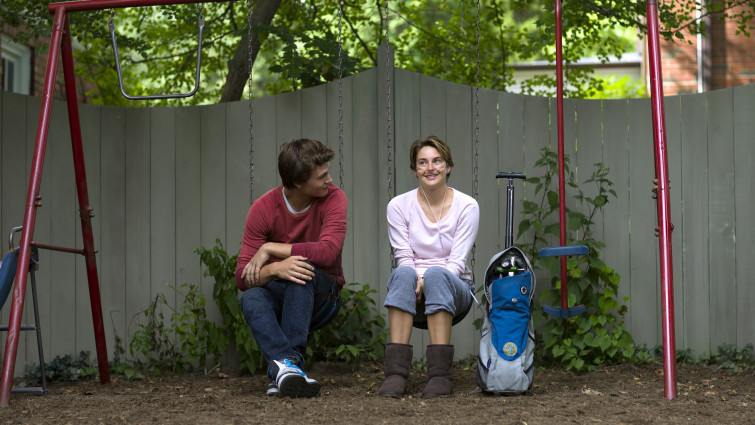

Member review

The Fault in Our Stars
Emotional romance based on the best-selling novel in which two terminally ill teenagers fall in love and face their fates.
Certificate
Duration120 mins
Review by
- Oliver, 17
- 40 reviews
Review by Oliver, 17
Too often “teen romances” scare away anyone over the age of 15 and almost all of the male audience. Or at least that’s what I’m told, but the box office figures would suggest that each of these teenage girls see the film around 5 times each, but I digress. Marketing campaigns may disagree with what I say, but “The Fault in Our Stars” isn’t a chick flick, it is in fact a surprisingly well told story. It concerns cancer — or more appropriately — the effect a person dying has on those around them, and what happens to those people left alive once the sufferer fades into oblivion. After a story ends what happens to the characters? Nothing, they are just characters in a fictional story and they were never real, and therefore can never cease to be real. “The Fault in Our Stars” isn’t real, but it could be.
Don’t expect any sugar coating here, the opening narration outright apologises for this. Hazel (Shailene Woodley) suffers from a severe form of lung cancer that began in her thyroid years before. Her survival has been called a miracle, and while she is still very sick and still has cancer, she is relatively stable. Unfortunately she is forced to carry a breathing apparatus around with her that is smartly kept as a form of luggage instead of a simple and portable backpack. She reluctantly attends a cancer support group and catches the attention of Augustus (Ansel Elgort) who is very persistent in spending time with her. The relationship that spawns between the two is a big part of this film but it is still only part of it, fortunately it is one of the best bits.
Augustus and Hazel quickly fall for each other and I can believe it too. Hazel appears very lonely before she attends the group and her doctor has diagnosed her with depression, “A side effect of dying” as Hazel puts it. Augustus has actually recovered from cancer and is incredibly positive and very charismatic, he is everything she needs and everything she wants.
“The Fault in Our Stars” is devastating, and many will be struggling to keep their faces dry, but who didn’t already know this going in? Director Josh Boone knows that you think it is going to be said and his film doesn’t pander to what is expected from it. It knows how to be provocative without being unbearably melodramatic and draining. People with terminal illnesses don’t just become walking depression bombs, they have to deal with their illness but who wants to spend their last days concerned with only their own problems? This is what we get to see, I couldn’t tell you how real it is because I have never experienced cancer, and neither has anyone I’m really close to. Though getting both sides of the emotional coin is very refreshing.
Hazel identifies most strongly with “An Imperial Affliction”, a fictional novel written by Peter Van Houten (Willem Defoe). Augustus had just read the novel despite his disappointment at learning there are no Stormtroopers in the book, and somehow managed to get Van Houten to reply to his first message ever. One of Hazel’s only wishes is find out what happened after the book had ended and the story had finished.
The couple eventually travel together to Amsterdam and this is where Hazel first tastes the reality of the world since she became the miracle survivor. Peter Van Houten turns out to be a man ripped by trauma who hides behind big words and unintelligible concepts. After he refers to Hazel as a “failed experiment”, we realise what kind of story this is. It is trying to be real and show us that not only does cancer not completely rot people emotionally, but at the same time the world is still out to get you.
The lines between fact and fiction are made, and we are asked to come to terms with the fact that after we die there will be little left. Like how nothing really happens to the characters after a story ends, they just sort of cease to exist. It seems obvious but you probably haven’t ever stopped to think about it unless you read “The Fault in Our Stars” novel by John Greene. It’s an odd concept and it applies to life as well and these kinds of harrowing thoughts creep into the story in ways that are sometimes more subtle than others.
Augustus carries a pack of cigarettes, he takes these wherever he goes. No, he doesn’t smoke — he just holds one between his teeth. A metaphor he calls it, he puts the thing that does the killing between his teeth but never gives it the power to kill him. However, when he is on a plane and is asked to literally take out the metaphor. It brings into perspective that it is merely a metaphor and can’t protect him any more than words on a page.
In the end you come away contemplating the fragility of life, whether or not we confuse reality and fantasy too often and also how death affects the living. Hazel describes herself as a grenade that will one day explode and take everyone with her, and we frequently see her guilt as she sees that she is a burden on those around her. She did not consider that she is a privilege to carry.